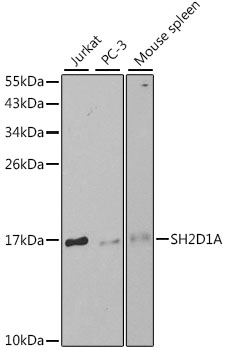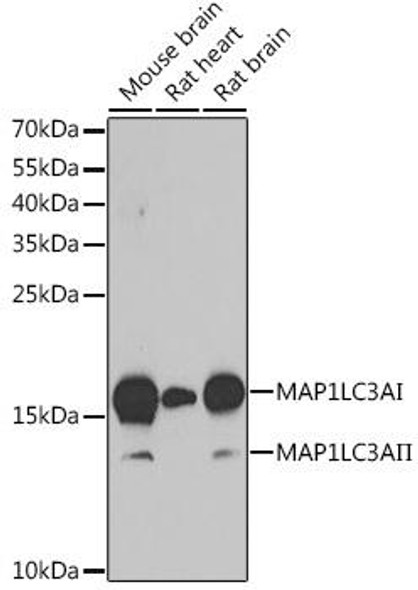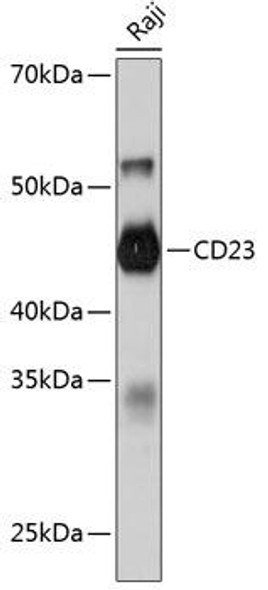Immunology Antibodies 1
Anti-SH2D1A Antibody (CAB1143)
- SKU:
- CAB1143
- Product Type:
- Antibody
- Reactivity:
- Human
- Reactivity:
- Mouse
- Host Species:
- Rabbit
- Isotype:
- IgG
- Antibody Type:
- Polyclonal Antibody
- Research Area:
- Immunology
Description
| Antibody Name: | Anti-SH2D1A Antibody |
| Antibody SKU: | CAB1143 |
| Antibody Size: | 20uL, 50uL, 100uL |
| Application: | WB IF |
| Reactivity: | Human, Mouse |
| Host Species: | Rabbit |
| Immunogen: | Recombinant fusion protein containing a sequence corresponding to amino acids 1-128 of human SH2D1A (NP_002342.1). |
| Application: | WB IF |
| Recommended Dilution: | WB 1:500 - 1:2000 IF 1:50 - 1:200 |
| Reactivity: | Human, Mouse |
| Positive Samples: | Jurkat, PC-3, Mouse spleen |
| Immunogen: | Recombinant fusion protein containing a sequence corresponding to amino acids 1-128 of human SH2D1A (NP_002342.1). |
| Purification Method: | Affinity purification |
| Storage Buffer: | Store at -20'C. Avoid freeze / thaw cycles. Buffer: PBS with 0.02% sodium azide, 50% glycerol, pH7.3. |
| Isotype: | IgG |
| Sequence: | MDAV AVYH GKIS RETG EKLL LATG LDGS YLLR DSES VPGV YCLC VLYH GYIY TYRV SQTE TGSW SAET APGV HKRY FRKI KNLI SAFQ KPDQ GIVI PLQY PVEK KSSA RSTQ GTTG IRED PDVC LKAP |
| Gene ID: | 4068 |
| Uniprot: | O60880 |
| Cellular Location: | Cytoplasm |
| Calculated MW: | 6kDa/8kDa/13kDa/14kDa |
| Observed MW: | 17kDa |
| Synonyms: | SH2D1A, DSHP, EBVS, IMD5, LYP, MTCP1, SAP, SAP/SH2D1A, XLP, XLPD, XLPD1 |
| Background: | This gene encodes a protein that plays a major role in the bidirectional stimulation of T and B cells. This protein contains an SH2 domain and a short tail. It associates with the signaling lymphocyte-activation molecule, thereby acting as an inhibitor of this transmembrane protein by blocking the recruitment of the SH2-domain-containing signal-transduction molecule SHP-2 to its docking site. This protein can also bind to other related surface molecules that are expressed on activated T, B and NK cells, thereby modifying signal transduction pathways in these cells. Mutations in this gene cause lymphoproliferative syndrome X-linked type 1 or Duncan disease, a rare immunodeficiency characterized by extreme susceptibility to infection with Epstein-Barr virus, with symptoms including severe mononucleosis and malignant lymphoma. Multiple transcript variants encoding different isoforms have been found for this gene. |
| UniProt Protein Function: | SH2D1A: Inhibitor of the SLAM self-association. Acts by blocking recruitment of the SH2-domain-containing signal-transduction molecule SHP-2 to a docking site in the SLAM cytoplasmic region. Mediates interaction between FYN and SLAMF1. May also regulate the activity of the neurotrophin receptors NTRK1, NTRK2 and NTRK3. Interacts with NTRK1, NTRK2 and NTRK3. Interacts with CD84, CD244, LY9, SLAMF1 and FYN. Expressed at a high level in thymus and lung, with a lower level of expression in spleen and liver. Expressed in peripheral blood leukocytes, including T lymphocytes. Tends to be expressed at lower levels in peripheral blood leukocytes in patients with rheumatoid arthritis. 6 isoforms of the human protein are produced by alternative splicing. |
| UniProt Protein Details: | Protein type:Adaptor/scaffold; Apoptosis Chromosomal Location of Human Ortholog: Xq25 Cellular Component: cytoplasm Molecular Function:protein binding; SH3/SH2 adaptor activity Biological Process: positive regulation of signal transduction; cell-cell signaling; cellular defense response; positive regulation of natural killer cell mediated cytotoxicity; humoral immune response Disease: Lymphoproliferative Syndrome, X-linked, 1 |
| NCBI Summary: | This gene encodes a protein that plays a major role in the bidirectional stimulation of T and B cells. This protein contains an SH2 domain and a short tail. It associates with the signaling lymphocyte-activation molecule, thereby acting as an inhibitor of this transmembrane protein by blocking the recruitment of the SH2-domain-containing signal-transduction molecule SHP-2 to its docking site. This protein can also bind to other related surface molecules that are expressed on activated T, B and NK cells, thereby modifying signal transduction pathways in these cells. Mutations in this gene cause lymphoproliferative syndrome X-linked type 1 or Duncan disease, a rare immunodeficiency characterized by extreme susceptibility to infection with Epstein-Barr virus, with symptoms including severe mononucleosis and malignant lymphoma. Multiple transcript variants encoding different isoforms have been found for this gene. [provided by RefSeq, Jul 2008] |
| UniProt Code: | O60880 |
| NCBI GenInfo Identifier: | 6094278 |
| NCBI Gene ID: | 4068 |
| NCBI Accession: | O60880.1 |
| UniProt Secondary Accession: | O60880,O95383, O95384, O95385, O95386, Q6FGS6, Q9UNR0 A8MSW0, |
| UniProt Related Accession: | O60880 |
| Molecular Weight: | 128 |
| NCBI Full Name: | SH2 domain-containing protein 1A |
| NCBI Synonym Full Names: | SH2 domain containing 1A |
| NCBI Official Symbol: | SH2D1A |
| NCBI Official Synonym Symbols: | LYP; SAP; XLP; DSHP; EBVS; IMD5; XLPD; MTCP1; XLPD1; SAP/SH2D1A |
| NCBI Protein Information: | SH2 domain-containing protein 1A; SLAM-associated protein; Duncan disease SH2-protein; T cell signal transduction molecule SAP; T-cell signal transduction molecule SAP; SLAM associated protein/SH2 domain protein 1A; signaling lymphocyte activation molecule-associated protein; signaling lymphocytic activation molecule-associated protein |
| UniProt Protein Name: | SH2 domain-containing protein 1A |
| UniProt Synonym Protein Names: | Duncan disease SH2-protein; Signaling lymphocytic activation molecule-associated protein; SLAM-associated protein; T-cell signal transduction molecule SAP |
| Protein Family: | SH2 domain-containing protein |
| UniProt Gene Name: | SH2D1A |
| UniProt Entry Name: | SH21A_HUMAN |
View AllClose







